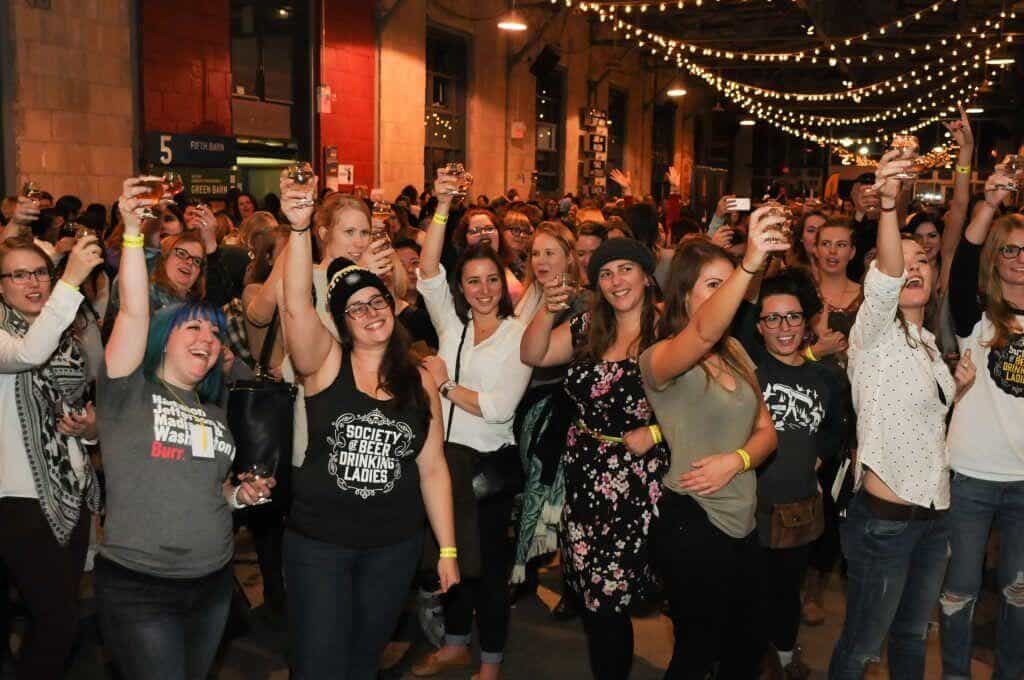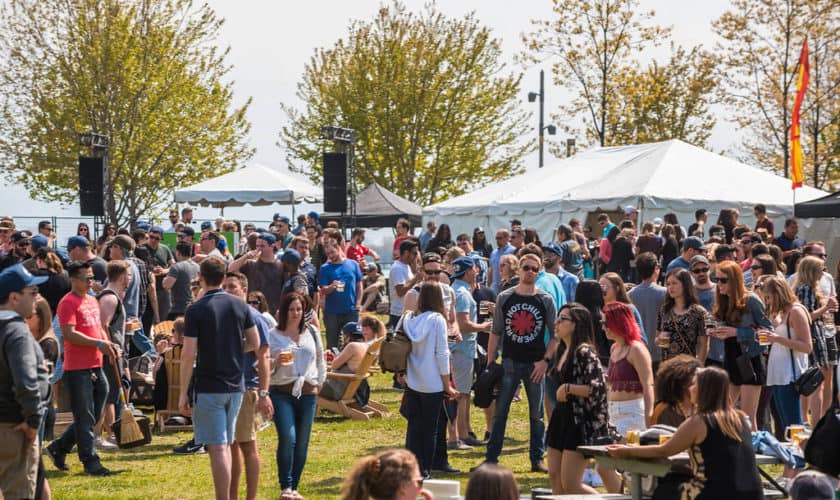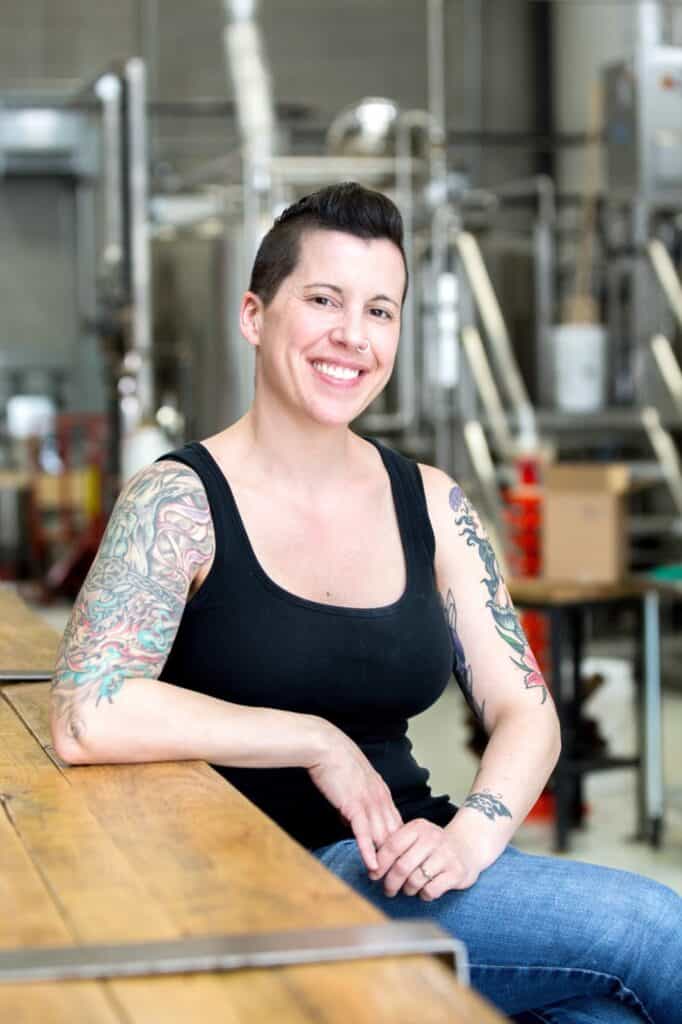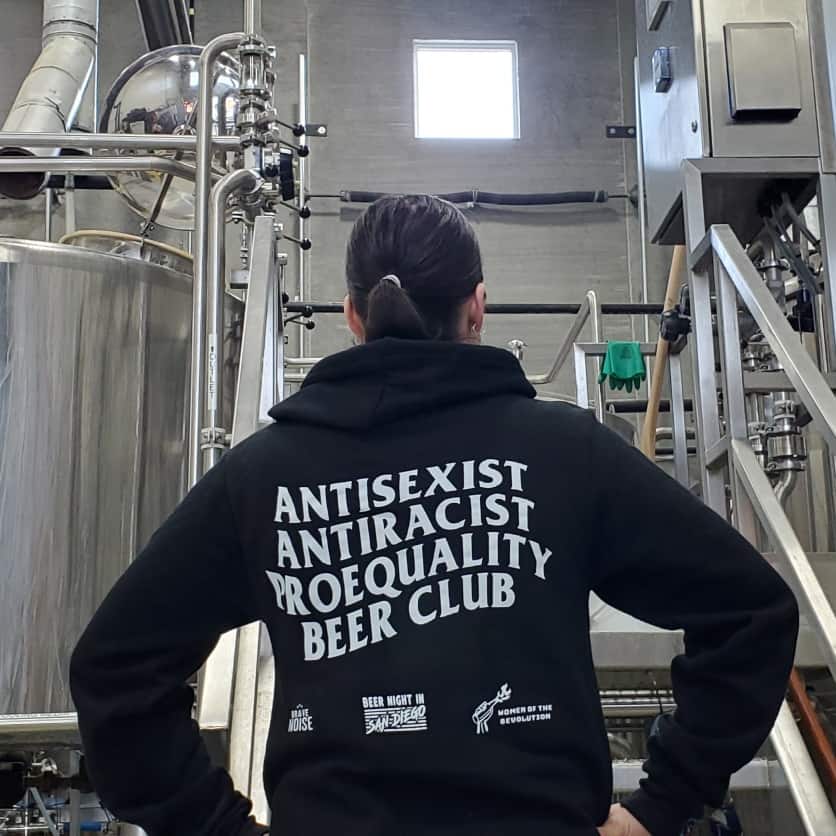Sexual assault and abuse stories in craft beer shared by Whitby brewery owner
Published January 31, 2022 at 9:55 am

Nine months ago, it was one question on Instagram that started a revolution: “Have you ever experienced sexism in the beer industry?”
The question was asked by Brienne Allan (@ratmagnet), a brewer and production manager at Notch Brewing in Salem, Massachusetts, and it was answered by a deluge of individual stories of abuse, discrimination and assault within the industry, all shared on Allan’s Instagram page.
Most of the stories were American experiences but there was plenty of Canadian content as well, and one of those who shared her story of abuse and discrimination was Erin Broadfoot, the brewer and owner at Little Beasts Brewing in Whitby. Broadfoot, an outspoken advocate of a beer scene free of racism, misogyny and homophobia, has taken it upon herself to pick up where Allan left off by sharing stories of abuse on her own Instagram page, @esbroadfoot.
The revolution was in need of a momentum boost anyway.
The wave of disgust and anger at the stories being shared last year was giving way to complacency, even after a collaborative beer project called Brave Noise, brewed to honor those who have spoken out about gender discrimination, racism, sexual assault, and harassment – and to bring awareness to the issues that women, BIPOC, and LGBTQ+ individuals face in craft beer – tried to keep the issue in the spotlight.
Just 211 breweries signed on to commit to a discrimination-free, inclusive environment, including 22 in Ontario, and some of them, Broadfoot suspects, signed up to give lip service to the cause.
Another concern and a driving force behind the project was a perception shared by many in and around the industry – mostly men – that it was more of an American issue and we in the Canadian craft beer scene were so much better.
(Disclosure: This writer was one of those voices and was ‘educated’ by Broadfoot and others during the @ratmagnet movement last year.)
“The craft beer industry is broken. Just as broken here in Canada as it is everywhere else,” Broadfoot said. “There are a tonne of known harassers, abusers and people who are known to have committed sexual assault still working in this industry.”
Most of the people who shared stories with Broadfoot did so anonymously, though some left their names. Many mentioned breweries and brewery people though this newspaper story does not for obvious legal reasons; for the most part, those sharing were also left anonymous as well.
It takes enough courage as it is to just share the stories, Broadfoot noted, in an industry “so heavily white-washed and male dominated it makes it too easy to identify those who share.”
“This what happens when you have a culture that victim blames,” she added. “The disbelief, ostracization, outright job loss and potential of being ‘unemployable’ once one has become vocal keeps the victims silent. And it protects the perpetrators.”
“This means people are stuck remaining in positions where they have been assaulted, have witnessed assaults, or have to deal with harassment, marginalization and/or demeaning, abusive behaviours. I’ve been in this spot. Way, way too many of us have been in this spot.”
Broadfoot opened her Instagram to stories at the beginning of last week and the tales were still coming in a week later. Some are quite graphic, some are highly emotionally charged, some are traumatic and all are appalling, especially for an industry that was once famously described as “99 per cent asshole-free.”
(Broadfoot supplied links to mental health programs and resources on her page for those who needed them.)

Toronto Festival of Beer
I’ve worked the jobs where every time a beer went wrong it was that “dumb bitch beer.” I’ve had bosses tell me they wanted to rage **** women who pissed them off. I’ve dealt with the jokes, the insults, the slurs. And for years I just accepted them as part of the job. It was a long journey learning to deal with the guilt, the responsibility of not fighting back, the feeling of ownership of what I experienced. It took me a long time to realize it wasn’t my fault. That I did what I did to fit in and make it in an industry where there was very little space made for people like me. And even less made for those less privileged than myself.
The stories come from women in the industry who had to ‘silence their voices’ for fear male colleagues would get upset when they didn’t get all the attention, or be told that despite years of experience, they were only getting the attention because of their gender.
They come from brewery owners being corrected (incorrectly) by customers or even other (male) brewers and not arguing because “it’s not worth the fight and he wouldn’t get it anyway.”
Sometimes it was about sexism on the brewery floor as male co-workers make no offer to help with a difficult task “just to see if I could do it.”
I was told I had no talent, that I’d tried and proven that I was incapable. That I should leave the industry because I’d never make it. Back then I didn’t attribute it to my gender. But now I recognize all of the other micro aggressions that happened there. One hundred per cent if I wasn’t female I wouldn’t have been dealt as much shit as I was.
Or the workplace sexism that’s all too familiar.
“Nothing sexier than a woman driving a forklift” – while I was moving out my spent grain. “You’re really strong for a girl” – re-stacking the pallets a contractor knocked down. Later that same contractor tried asking me out on a date. Hard pass.
And what kicked off my exodus from craft was finding out that a man that had been working there a year less than I – and not even a brewer – was making $2 an hour more than me. Working now in R&D for a major brewery is like night and day.
Most of the stories were about sexism and abuse but racism and homophobia also reared their ugly heads. There was the woman and her business partner who were trying to organize an Ontario Beer Summit in 2020 and were trying to line up some diverse voices in beer and science.
“We had the industry dudes commenting that the Summit wasn’t needed since we didn’t have an issue with diversity in beer.”
The indigenous brewery worker who was always careful not to drink too much for fear he’d be known as the “drunk Indian only there to drink” would respectively disagree.
I was called Prius because I’m half native, therefore I only need half the amount of gas.
And there was a manager at a cottage country brewery who approached the female and openly gay head brewer to talk about a baker who refused to make a cake for a gay wedding.
“The faggots are at it again,” he said before doubling down and comparing homosexuality to a terrorist organization. “Imagine if ISIS asked you to make a beer.” That same manager, the poster said, was also under fire more recently for saying “some heinous racist shit” about George Floyd’s murder.
A common thread was women in job interviews being asked when they were going to get pregnant. In fact, that tale was repeated enough that is seems to be an unofficial policy at several breweries.
Some stories involved well-respected people in the industry who were accused of taking free beer for events from known sexual predators, while other involved inappropriate behaviour from brewery people around the province that had reputations of being among the good guys.
If anyone was surprised by the stories flooding her inbox, it wasn’t Broadfoot. Been there, had to buy the stupid t-shirt. Her biggest fear was that the project wouldn’t take off and the stories wouldn’t be told at all.
“When I decided to launch this initiative a couple of weeks ago, I was terrified it wouldn’t take. It can be surprisingly hard to get peoples’ attention and convince them to engage with the issues. To get people to listen and inspire them to affect actual change. To convince an industry comprised mainly of straight white men to stop marginalizing Women, Black People, Indigenous People, Asian People, 2SLGBTQ Folks, Differently Abled People – and every other community I haven’t mentioned here.”

Erin Broadfoot, Owner/Brewer Little Beasts Brewing
People DID respond, however, and a common theme was not being taken seriously by men in the industry.
Typically, the worst I deal with are breweries looking to get carried at my bar who are surprised that I am the one curating the beer list, that I am an owner and that I am also a woman. I’ve had reps come in … never bothering to introduce themselves until they hear someone call my name. Then they realize I am the Jesse they were looking for. This one makes me laugh – they are always so surprised.
It’s very frustrating and exhausting knowing you are good at something and constantly having to prove to male counterparts that I, in fact, know what I am doing.
Or …
Most of the sexist comments I endure are from customers and suppliers. It’s peoples’ surprise that gets me. You like beer? Are you the boss? Can I talk to Jeff? You better ask Jeff before making this decision etc., etc., forever amen
And worse.
I have heard, time and time again, “they only invited you because you are female,” “you only got asked to do this because you’re female,” “you only got picked because it’s a small pond of people like you.” I have been discredited over and over and over again.
Sometime, just saying you believe in equal rights for woman is enough to earn a reputation of being ‘difficult’ to deal with.
When I first started advocating regularly for womens’ rights in the beer industry I was told to be careful by one of my employers because I was ‘stereotyping’ myself.
For some, it can seem impossible to see how progress can be made.
I just want to highlight that it doesn’t matter what you do, if you get in the way of a man – bro, ally, whatever – it’s so easy for them to call you a difficult woman, and then that’s it. You lose all credibility and there’s nothing you can do. If you defend yourself, it’s proof that you’re ‘difficult.’
And then there are the woman brewers who get interviewed in the media and every conversation is about being a female brewer in a male-dominated world.
If I’m speaking about my experiences as a woman in the industry, then yes, I am a female brewer. Otherwise, I am just a ******* brewer. Always having my name attached to my gender is devalidating as ****. I am not your diversity quotient. I AM A Brewer. Period.
Some of the tales just make you shake your head in disgust, such as the brewer who was approached at a beer conference and asked if she was looking for a head brewing position. A few questions in the interviwer noticed she was wearing a wedding ring.
“He asked if I was married. I said yes and he laughed and said, never mind. I was just looking for an ‘in.’ I was literally speechless.”
It gets worse, with many tales best left to the police blotters and more often as not, nothing is ever done.
I was working full-time as a bartender and one day when both myself and the night bartender were doing changeover one of our managers came behind the bar to assist. She turned to my co-worker for a question then turned to me, looked at me dead in the chest and says, “Courtney, why don’t YOU ever put your tits in my face?”
A few days later I made a dummy e-mail and emailed head office. I explained the situation and that I was writing from a new account because I was afraid to come forward without knowing if I was protected and I needed my job, I never heard a damned thing.
*
When I worked for one of the biggest breweries in the world, my boss got handsy and tried to make out with me during a work trip in front of all my brand-new co-workers. I was mortified. I reported him and his advances to my supervisor and after an internal investigation that lasted probably a couple of days, and of which I had no intel on what was said or done, I received instructions to re-direct my work emails to someone new. I was so afraid I would run into him any time I was in the office.
*
I was cornered coming out of the washroom at the welcome party for the 2020 MBAA conference in Kingston. A former brewer-now-supplier and consultant greeted me with “where’s my hug?” I laughed uncomfortably and tried to skirt around him back to my group of friends but he physically blocked every step I took. It wasn’t until another male attendee took notice and put himself between us that I was able to get away. His explanation to the guy that stepped in was that ‘we go way back and that’s just our thing.’ It isn’t.
*
Some of stories are just plain horrifying.
One of the brewery owners is a well-known sexual offender. He has a long history of making women feel uncomfortable at the brewery. He sexually assaulted a woman who was at the brewery (the assault happened outside, but adjacent to the brewery). He was charged for the assault.
*
I was drugged at a very popular, well known craft beer festival. I was then recorded and that video was passed around. Multiple times following the incident I tried to tell people I was drugged/had something slipped in my drink. No one would believe me. They just laughed at the video and insisted I got blinding drunk and didn’t want to admit it, I finally gave up and just committed to never, ever talking about it again.
I haven’t had more than four samples at the couple of beer festivals I’ve been to since. I do not feel safe in these environments at all.
*
I was grabbed by the throat and violently sexually assaulted in the lobby of a bar. It wasn’t the first time I was assaulted but I was ready for it to be the last. I tried to bring charges against the guy who attacked me but I was not successful.
Do not challenge a woman or man who has been assaulted and say ‘why didn’t you lay charges against them?’ Attempting to lay charges usually harms the victim more than it does the attacker. It isn’t easy to lay charges or to get those charges to stick. Even if the accuser is 100 per cent truthful and honest. Victim blaming is bullshit and needs to stop.
Others stories fall into the category of just plain disgusting.
The owner of the brewery is known for hiring girls he’s attracted to. He hired one girl over the summer for this reason. Once he got what he wanted from her he asked her to resign the following day because he got back with his ex.
*
When I first got into beer and I was trying to interact with our local homebrew group I had a member tell me that I could drink with them, but only if I showed up with my tits out. I later found out that one of my friends, who was also my employer at that point, was one of the voices behind that.
*
At my first brewing job I looked to my head brewer/boss for advice. He was a much older man and people warned me he could be creepy but I thought to myself, ‘how bad could it be?’ It wasn’t long after that he began to get very inappropriate with me; reaching into my pants pockets to ‘borrow’ tools instead of just asking me to pass them to him and becoming obsessed with my body.
He made me so uncomfortable for months. I wish I could go back and tell my 23 year-old self she didn’t have to put up with that shit. To this day I regret not standing up for myself.
*
I had a dude threaten to do terrible things to me at a beer festival because last call happened and I could no longer give him his 6 oz sample. Went from telling me I was beautiful (when he thought he could get a drink) to telling me I was a ****** whore and that he’d do terrible things to me. FOR A SAMPLE OF BEER.

The biggest fear with sharing these stories to the world is they may not all be true. As a society it is hoped we are beyond doubting the accuser, but vindictiveness is real and Broadfoot is aware of some stories that may have dubious merit, which is why she started banning naming names a few days into the experience.
“False stories invalidate everyone else’s stories. They ruin lives. If you want to call out a brewery for abuse, that’s fine. But not a specific person’s name. That’s for the courts. Not here.”
The overwhelming majority of the tales told, however, are straight from the heart and paint a picture of an industry that is not as welcoming to those who are not white and male as its self-proclaimed image would have you believe.
Is the reckoning upon us? Broadfoot has no idea, but she sure hopes so.
“The industry can’t pretend it’s not an issue when it’s right there in front of everyone,” she said. “Thank you to everyone who has, is, and plans to share their stories with me. Hopefully everyone who is shocked, surprised or felt that we were better here is starting to see.”
“We all talked to each other. We all knew there were a disgusting number of problems. We all knew it wasn’t unusual for a single individual to be able to relay a ridiculous volume of stories and experiences. To everyone asking how they can help right now: amplify, listen and believe people when they tell you something is not okay.”
This industry definitely needs a change. I have had innumerable instances of being talked down to, underestimated and treated with disdain over the past 7-8 years for taking a job away from a ‘more deserving man.’ From owners, managers, supervisors, coworkers and loads from ignorant customers too. These types of interactions are so commonplace and insidious that no one specific occurrence really sounds all that terrible – it’s more like death from a thousand paper cuts. The odd misogynistic comment here and there over years adds up and creates a culture where you feel pretty powerless in your workplace, especially as a leader. It can really rock your self-esteem and confidence, even after proving to yourself and others that you deserve everything you’ve earned.
Erin Broadfoot took Sunday off to rest from social media so today is Day 7 in her Instagram experience of sharing stories of sexism, misogyny, racism, homophobia and violence in the craft beer industry.
And the stories keep rolling in…
insauga's Editorial Standards and Policies advertising






